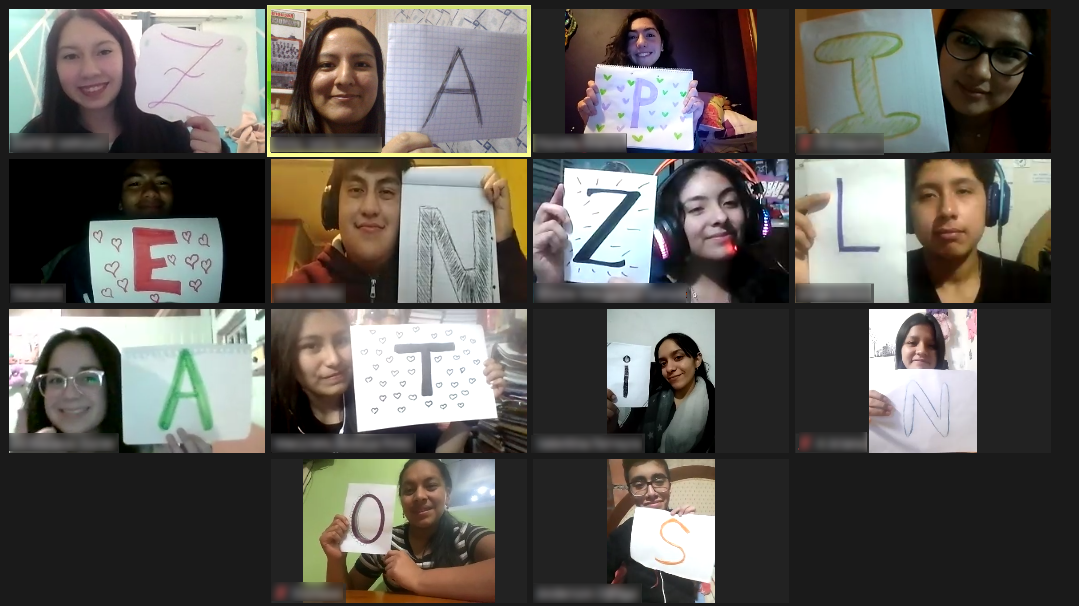Network Students Come Together in Response to COVID-19

Earlier this year, as schools around the world were beginning to close as a result of COVID-19, Teach For All’s Student Leader Advisory Council (SLAC) met to discuss how to support their peers during the pandemic. They developed ideas for a number of projects, including workshops to support students’ emotional needs and a hackathon where students and adults could come together to design solutions to common challenges. The SLAC members split into smaller working groups alongside Teach For All global organization staff members to take these ideas forward.
More than 40 attendees joined two Student Support Workshops hosted by SLAC members. During the first workshop, attendees created life maps, discussed their hopes and dreams, and shared messages of gratitude. Building on this experience, in the second workshop students used the SMART (Specific, Measurable, Achievable, Relevant, and Time-bound) goal framework to help them turn their aspirations and visions into measurable, attainable goals for their future. “Our whole theme was...we want students to feel connected to each other,” explained SLAC member and Teach For India student Raghvendra Yadav, who helped organize the workshops. “And not just students, but everyone on the call.”
Yelyzaveta Shelestova, a SLAC member and Teach For Ukraine student who also helped plan the workshops, agreed. “The most important thing I learned was that even though we have different life stories, we are struggling with the same problems,” she shared, reflecting on her own workshop experience. “We felt super connected to each other because of that, and it gave us really good and positive emotions.” A student from South Korea, the SLAC members explained, revealed during a workshop that he hadn’t felt such a connection with other teens before, even his school friends. “It was such a grateful moment for all of us,” Raghvendra said. Ultimately, as SLAC member and Teach First Danmark student Lykke Storgaard explained, the students were pleased with the workshops because “we succeeded in reaching our goal of connecting people and still having each person open up and share.”
Members of the SLAC also hosted a virtual hackathon during which students and teachers reflected on issues in their communities, and then broke into groups to brainstorm possible solutions. Each group focused on a specific topic of interest to the group members, including community development, online learning, and student voice and choice.
SLAC member and Teach For America student Ava Ward helped organize the hackathon, and participated in the group that focused on the importance of student voice. Some of the issues that surfaced in their group discussion included power dynamics between teachers and students, racial and gender inequalities, and the need to support young students in developing self-confidence. The group determined that a successful solution to these challenges would foster stronger student-teacher bonds and facilitate the development of student confidence and voice from an early age. “Every voice should be empowered and every student should have a voice,” Ava said.
Inspired by the hackathon hosted by the SLAC, Zapienz, a community of young Latin Americans (primarily students of Teach For All network partners) who are working to revolutionize education in partnership with adults, organized a Spanish-language hackathon with support from Anny Julca, an alumna of Enseña Perú. Over 75 students and teachers from countries including Peru, Argentina, Ecuador, Mexico, Chile, Venezuela, Brazil, Colombia, and the United States came together for the hackathon to discuss issues related to the UN Sustainable Development Goals, including quality education, climate change, ending poverty, health and wellness, and gender equality.
José Luis Damian Núñez Burdiles, an Enseña Chile student and Zapienz member, helped organize the hackathon and led the group discussing health and wellbeing, which focused on public health and the lack of resources in hospitals and primary care health centers. José appreciated the different perspectives group members—including teachers, psychologists, engineers, and students—brought to the discussion. “Each one perceived the problem in a different way and brought up aspects that had not even crossed the others’ minds,” he said. While few groups arrived at specific solutions to the challenges they were exploring, José is confident the experience was enriching for all. During the process of “hacking” the issues, “each problem expanded to a range of new problems, making clear the complexity of the reality in which we live and for which we must prepare as students,” he explained. “It became clear to us that our learning cannot be fragmented into isolated subjects, but must be integrated if we really want to understand.”
Learn more about Teach For All’s Student Leader Advisory Council.



